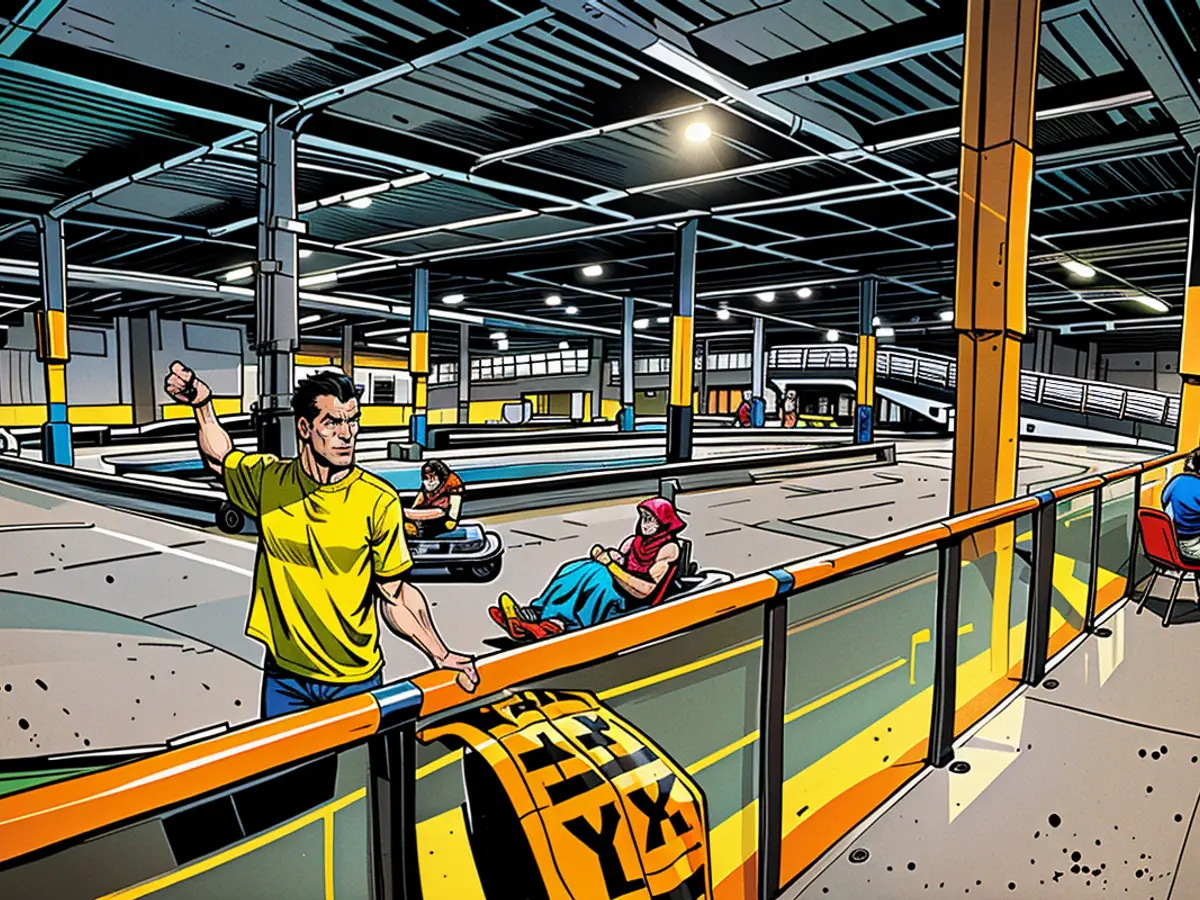At these abandoned Sears locations, things are more entertaining than ever.
Instead of being reborn into new retail spaces, certain companies hope to attract families and entice them to spend money again in large commercial areas. This is because while households are cutting back on purchasing more items, they seem to be opening their wallets for dining out and entertainment at events like concerts and amusement parks.
Michele Oca, who founded the design and marketing firm US Design Lab in Tampa, Florida, specializes in reimagining and revamping empty commercial spaces with an emphasis on fun. They include attractions like bowling alleys, arcade games, rope courses, go-kart tracks, mini golf and laser tag. Surrounding these activities are restaurants and bars.
Oca's client, E8 Properties, has been acquiring empty Sears stores, refurbishing them, and transforming them into the "Elev8 Fun" initiative in collaboration with Primetime Amusements, a company that provides video arcade machines. The first location opened in January 2022 in a 120,000-square-foot former Sears building attached to the Seminole Town Center Mall in Sanford, Florida.
E8 Properties, which focuses on developing family entertainment centers, has been relentlessly expanding "Elev8 Fun" in Florida. Oca said they target spaces of at least 100,000 square feet, with more attractions being introduced in each location.
The second spot, also in a former Sears store, opened in May 2023 at the Citrus Park Mall in Tampa. A third station, set in a converted Sears at the Treasure Coast Square Mall in Jensen Beach, is slated to open the next summer.
A fourth spot, in a former Kohl's store at the Miami International Mall, is predicted to open in late 2025.
Focusing on fun over commerce

Adding more entertainment instead of commercial tenants to malls may be an effective approach to draw more customers, as shopping malls fight to stay relevant to younger shoppers and utilize space that may be safe from the e-commerce onslaught.
"If you examine year-over-year retail sales growth by different segments, department stores, furniture, sports shops, electronics retailers - those are the typical mall tenants that are being eroded by e-commerce," said Victor Calanog, managing director, global co-head of research and strategy, real estate, with Manulife Investment Management.
These experiential activities fall under economists' classification of "non-traded goods."
"They can't be bought online and replicated, they must be experienced in person," Calanog said. "So I do think it's an effective strategy, and then it becomes an execution issue and how well these concepts are publicized to draw in families as an entertainment destination."
As evidence suggests, a growing number of malls are transforming into family entertainment spots where shopping might not even be the main draw.
Industry analysts assert that adding entertainment experiences contributes more money to mall retailers rather than taking it away from them. Amid the pandemic, the allure of pickleball expanded into malls, with courses setting up beside ice skating rinks. Other amusements like indoor skydiving, Legoland theme parks, virtual golf, and microbreweries are gaining popularity.

Calanog asserted that stores, not just malls in general, are grappling with determining their unique value proposition compared to their online counterparts.
However, despite being a former Sears or a shuttered Kohl's store, redesigning a wide, empty space into something entirely distinct is a challenge.
"There are many unique challenges. Those stores have many columns, and it wasn't easy to fit attractions like Go-Karts and bowling through those columns," said Oca.
The completed "Elev8 Fun" projects took over a year to develop and cost more than $15 million per location, encompassing the expense of purchasing the empty space for renovation and equipping it with various attractions.
"We didn't just design the layout and aesthetics of the space; we also developed the brand name and logo for this new entertainment enterprise for our client," said Oca. "We also analyzed the local population and competing entertainment centers to determine which attractions were suitable for each new "Elev8 Fun" center."
"If there was already a significant bowling center a few blocks away, I wouldn't put bowling in the "Elev8 Fun" location near it," he added.

The only real competition for family entertainment in Sanford was located roughly 30 minutes away in Orlando, with Walt Disney World and Universal Studios.
"Sanford was a relatively untapped market with a large residential area," Oca said. "So, we decided to pack all the attractions we could into that old Sears building."
At the Tampa Mall site, Oca extended the entertainment outside by installing an outdoor rope course next to the remodeled Sears building along with all the indoor activities.
The founder of Hull Property Group, Jim Hull, who owns the Citrus Park Mall in Tampa, told CNN that to keep customers entertained and spending money in malls, owners and operators must constantly come up with innovative concepts.
Jim praised Elev8 Fun, stating it meets the criteria of being "well conceived" and making a "prominent statement." He considers it a "transformational facility" that stands out as "clever, inspirational, and aspirational."
Hull estimated that sales at the Citrus Park Mall increased by approximately 5% after incorporating the indoor park in the former Sears store. However, he stressed that the achievement depends largely on excellent management and a focus on customers.

"I'm not sure that everyone who visits the mall will also shop here," Hull said. "We don't want anyone in the mall who is not shopping. We are adamant about this, but we are also dedicated to providing a complete experience for our customers."
Read also:
The business strategy of E8 Properties involves transforming abandoned Sears stores into family entertainment destinations, such as the "Elev8 Fun" initiative, which features attractions like bowling alleys, arcade games, and restaurants.
In response to the shifting consumer behavior, companies are investing in providing more entertainment options in large commercial areas, hoping to attract families and boost their spending on dining and events.








